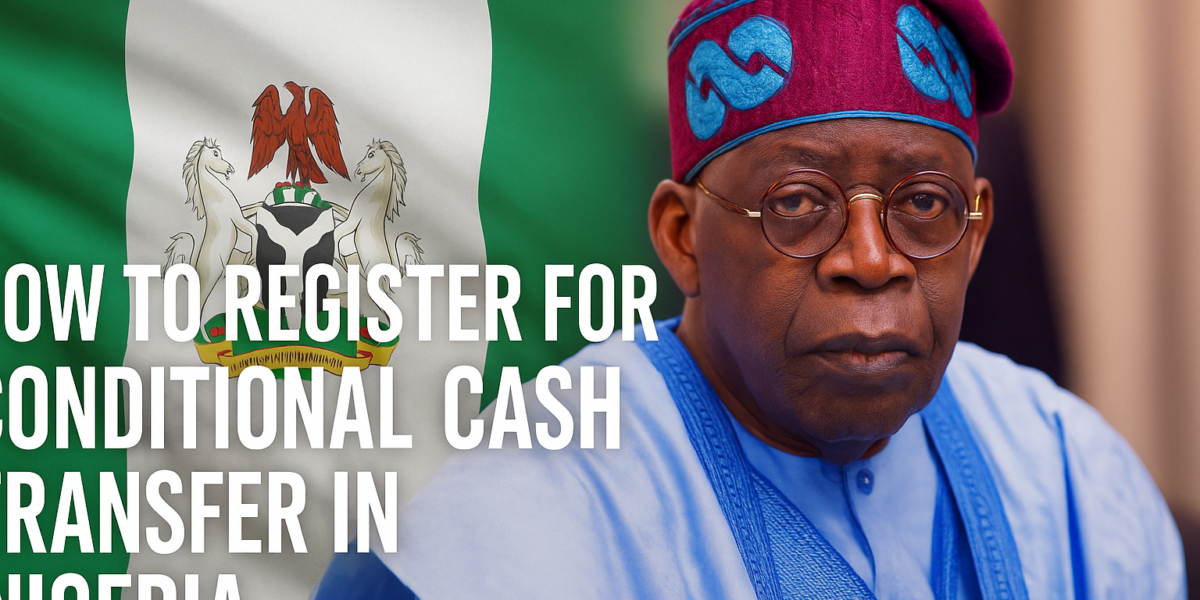How to Register for Conditional Cash Transfer in Nigeria

Poverty is one of Nigeria’s primary challenges. With millions of Nigerians living in poverty, the government has launched many measures to alleviate poverty and socioeconomic vulnerability. The Conditional Cash Transfer scheme is one such initiative targeted at reducing the number of needy households in Nigeria. Unfortunately, not all needy and qualified households know how to register for conditional cash transfer in Nigeria.
Fortunately, this article aims to address that issue by offering a detailed description of how to register for Conditional Cash Transfer in Nigeria (CCT). Continue reading to learn more about the registration process for Nigeria’s Conditional Cash Transfer initiative.
How to Register for Conditional Cash Transfer in Nigeria Online
How to Register for Conditional Cash Transfer (CCT) in Nigeria will be covered below:
STEP 1: Community mobilization and stakeholder sensitization:
This stage begins with the necessary capacity building for State and Local Government staff, intending to engage and sensitize community leaders and members.
During community mobilization, community leaders are engaged and informed about the HUP-CCT program’s goals and objectives. The benefits and projected outcomes are explained to the leaders. By providing information to community leaders, we hope to gain their approval of the program and support for the implementation process.
This activity emphasizes poverty reduction through human capital development by supporting sustainable livelihoods and strengthening the resilience of affected households and communities to economic shocks and risks.
Based on eligibility, the NSR beneficiary list is disclosed at a location designated by community members for unhindered access for confirmation by community members who had previously identified the community’s poor and vulnerable households through a Community-Based Targeting (CBT) process for planning purposes.
STEP 2: Beneficiary orientation:
This activity provides beneficiaries with an overview of the program, including background, goals, roles, and responsibilities. It also includes information on the Grievance Redress Mechanism, which can be used to address any dissatisfaction with the program.
Caregivers and alternates: The primary caregiver (ideally a woman) is in charge of obtaining the benefit (cash and training) on behalf of the household. When the primary caregiver is unavailable, the alternate caregiver is expected to take over this function.
The beneficiaries are also shown how to choose Caregivers and Alternate Caregivers from each beneficiary’s home without intervention from Cash Transfer Facilitators.
STEP 3: Data collection and creation of program identity cards:
The Beneficiary Orientation event is followed by electronic data collection of caregiver and alternate caregiver information from the household utilizing an enrollment mobile application that securely retrieves data from a central database for poor and vulnerable households.
Cash Transfer Facilitators (CTFs) generate and distribute program identity cards to beneficiaries in participating areas using the data collected, under the supervision of State Cash Transfer Unit workers. On payment day, beneficiaries present their program identity cards for identification in order to collect program benefits.
SEE RELATED ARTICLES
How to Register a Business Name in Nigeria Legally
How to apply for Federal Government Conditional Cash Transfer online
The process of registering for a Conditional Cash Transfer (CCT) program, which normally involves the National Cash Transfer Office (NCTO), includes community engagement, stakeholder awareness, beneficiary orientation, and data gathering. Poor and vulnerable households listed on the National Social Register (NSR) are eligible.
What is the *969# conditional cash transfer?
It allows Conditional Cash Transfer program beneficiaries to monitor their status and receive timely cash transfer updates. The USSD Code also enables the rapid reporting of errors or delays in the help process.
FG 25,000 cash transfer portal
Since November 7, 2023, the Tinubu Palliative Registration Portal has provided Nigerians with a cash transfer of ₦25,000 as part of the government’s subsidy elimination tactics.
In October 2023, the federal government implemented the Tinubu 25000 Cash Transfer, which will provide three months of assistance to 15 million needy households.
Note: Eligible Nigerians will receive ₦75,000 within 90 days by multiplying ₦25,000 by three.
Many Nigerians are looking for ways to get access to the Tinubu Palliative Portal in order to take advantage of this program before it is closed by the federal government.
Any beneficiary must provide certain information to be eligible for the federal government’s cash transfer program.
FG 25,000 Cash Transfer Portal Requirements:
- FULL NAME
- PHONE NUMBER
- BVN (OPTIONAL)
- ACCOUNT NUMBER
- ACCOUNT NAME
- BANK NAME
- GENDER
- DATE OF BIRTH
- MARITAL STATUS
- STATE/LGA
- Names of Your 2 Children Or Your Brother
It should be noted that a wallet bank account will be formed for the beneficiaries; thus, supplying your account number is optional during registration.
To apply for the Tinubu Palliative Registration Portal, it is important to understand the process. FG Conditional Cash Transfer
The newfound hope CCT is an important effort aimed at alleviating poverty and improving the lives of millions of Nigerians. The FG cash transfer initiative provides direct financial help to 15 million people, allowing many disadvantaged families to gain economic respite.
The administration is dedicated to making the FG 25,000 cash transfer site more open and accessible by continuing to develop it and introducing the usage of digital IDs. As details emerge, eligible Nigerians must stay informed and take advantage of this assistance program.
Conclusion
To learn more about the CCT program in your locality, contact the NCTO. You can contact them by phone at +234 813 8021 083, email at info@ncto.gov.ng, or through their website. Inquire at your local government office: They may have information on how the initiative is being implemented locally.






